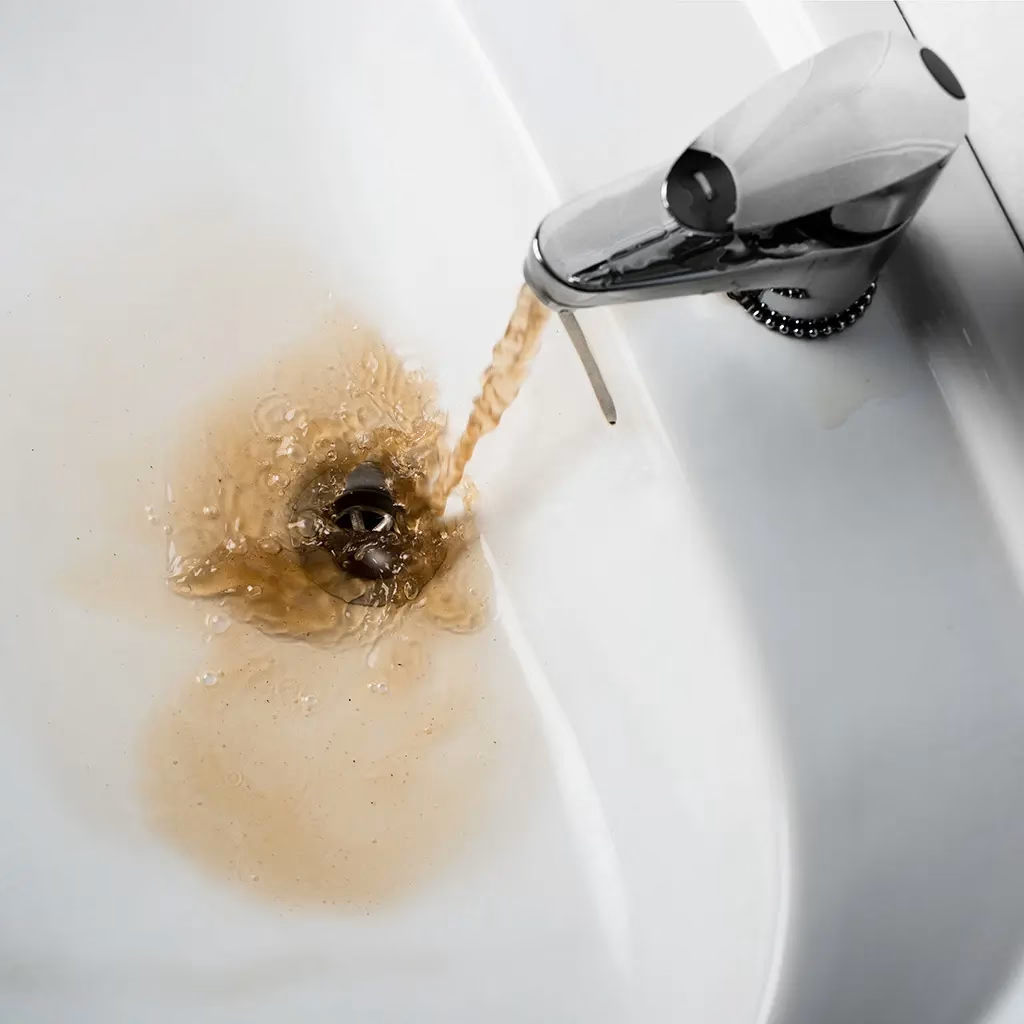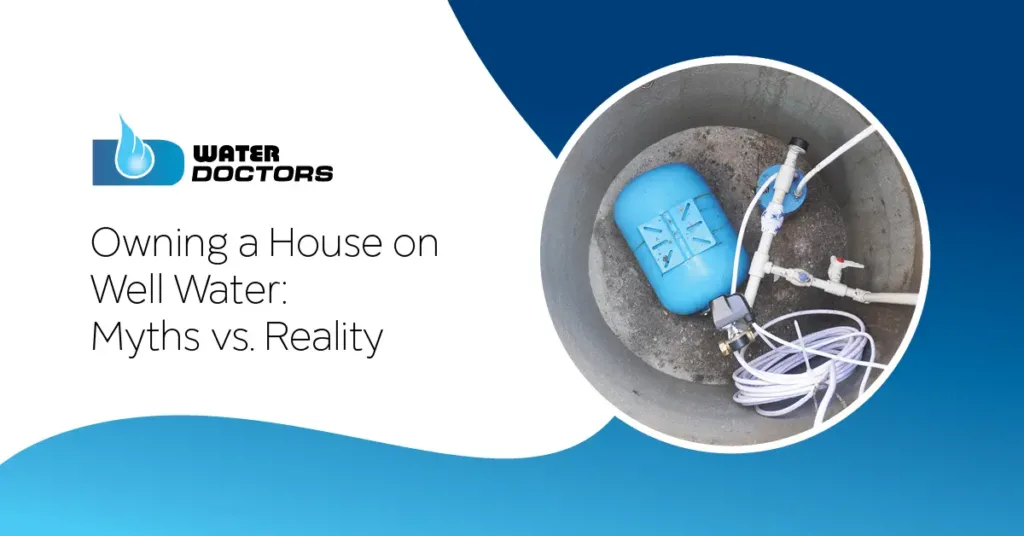What New Homeowners Should Know About Owning a Private Well
For lifelong city dwellers looking to relocate to remote suburbs or rural areas, there may be some unknowns that spark fear or discomfort. If you’re accustomed to a municipal water supply, one of these unknowns is living off of well water. What’s involved in owning a well? How expensive is it? Is the water safe to drink? Do you need special equipment? Water Doctors is here to set the record straight and debunk common myths about water from a private well.


Myth #1: Owning a Well Is More Expensive Than Using City Water
Not so! Added up, the total costs associated with well water and city water are very comparable. It’s more a question of when you spend your money, and what that money is used for.
With municipal sources, the costs for access and city-level maintenance for water service (and typically sewer service as well) are rolled together and charged to homeowners on a monthly or quarterly basis on your water bill. The amount you pay is associated with your usage rate, so longer showers, watering the garden, or filling the swimming pool means higher bills. When you live on city water, you make lower payments on an ongoing basis, presumably in perpetuity, and your only way to control costs is to conserve water.
By comparison, a private well involves larger upfront costs for equipment like the pump and pressure tank. The cost of the existing pump and pressure tank is already factored into the price of your home. Once this investment is made, the equipment should last for 15-20 years. You don’t pay for usage, so soak in that 90-gallon jacuzzi tub as often as you wish! There will be some smaller periodic costs for maintenance and quality testing, but no constant stream of bills like you’d have with a municipal source.
Beyond the well equipment itself, you’ll want a water treatment system in your home to make sure your water is soft and ready to use. Water Doctors can provide this equipment on a purchase or rental basis, depending on your preferences. (We’ll cover equipment rentals in Myth #2!) It’s worth noting that water quality treatment involves similar costs regardless of your water source. Once the water reaches your house, Water Doctors implements the same style of filtration, softening, and treatment processes for well water and municipal water, with minor variations on the exact filters used.
In the long run, it’s possible that owning a well and controlling your own costs could even be less expensive than living on municipal water. After all, utility prices never seem to decrease. Pricing is determined by the city or town where you live and may even be affected by nearby major cities, depending on watersheds and tax needs.
Myth #2: If Previous Owners Rented Equipment, New Homeowners Must Also Rent
As we mentioned before, some homeowners choose to rent their water treatment components, but many choose to outright purchase as a more common solution. It’s a common misconception that you must continue their rental. Since you personally don’t have a contract with the rental company, you can choose whether to rent or own. You can also have existing rental equipment removed from a home when you buy it and upgrade to ensure you have the best quality water!
When you rent, part of what you’re paying for is peace of mind. A rental arrangement enables you to easily upgrade your equipment and frees you from the surprise expenses of maintenance and service calls, all for an affordable monthly payment. It’s a great option if you won’t be staying in your home for a long time or you simply want a hands-off approach. That said, some homeowners prefer the peace of mind that comes from owning water treatment equipment, which protects up to 20% of the value of their home. The choice is yours, depending on what types of payments you want to make and how responsible you want to be for maintenance.
Myth #3: Well Water Contains Dangerous Toxins That Make It Undrinkable
Well water is perfectly safe to drink and use when treated properly. Mindful maintenance and treatment are important for your home to have quality water, regardless of how the water gets to you.
All water, whether it’s from a private well or a municipal source, comes from a natural source initially. With those natural sources come contaminants, and in Southeast Wisconsin, all sources of water will be hard. It’s true that city water is treated before it reaches a house, but this treatment alone isn’t sufficient to make the water soft, pure, and drinkable. Both well water and city water must be given attention once it reaches your house for it to be the best possible quality. There are only slight differences in how these two sources should be handled.
At Water Doctors, our treatment processes are tailored to the exact contents of your water. The first step is filtration, and here’s where we find the only major difference between well water and city water. Our filters for city water focus on chlorine and other disinfectants, while our filters for wells are designed primarily for eliminating sulfur and iron. After filtration, either type of water is softened, protected from bacteria and other pathogens, and then treated for drinking and consumption. As you can see, the treatment process is the same.
Myth #4: The Well Passed a Home Inspection, So It’s Good to Go
Not quite. Even the best home inspector is likely not an expert in water equipment. Wells get tested during a real estate transaction, but the type of test that’s performed when a house is bought or sold is looking for minimum viability for financing purposes, not for drinking quality or softness. The water is tested for the presence of bacteria, nitrates, and arsenic, but this isn’t comprehensive of everything that can be in your water, nor does it promise that your water is 100% free of these substances.
Cities regularly test their water quality and proactively correct any issues. As a well user, this responsibility falls on you. We recommend yearly water tests to determine the exact contents of your water, which will help us form a custom treatment plan. And yes, your water can change from year to year, depending on certain factors like rainfall, pesticide use, and the addition of new wells that tap into your aquifer. An annual inspection of your pressure tank and other equipment is a good idea, too.
Water Doctors will happily perform a FREE water quality test on your well. We do not perform well water tests for real estate purposes. For these tests, we happily recommend our friends at 4-D Water Well & Pump Service.
Myth #5: A Home’s Well Might Dry Up
We’ll call this one a partial myth. It’s true that wells do occasionally dry up due to uncontrollable factors, but this is extremely rare. When Mother Nature interferes in the form of a drought, all water sources (wells and municipal alike) can suffer. Don’t let this hold you back from owning and using a well.
Banish Your Well Water Worries
If you’re thinking about buying a home that uses well water, don’t be afraid! You may need to adjust to different maintenance needs or expenses, but the Water Doctors team can help you get the best possible water from your well. Schedule a FREE consultation to get started!
